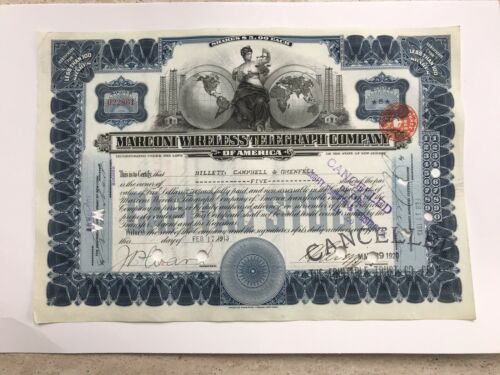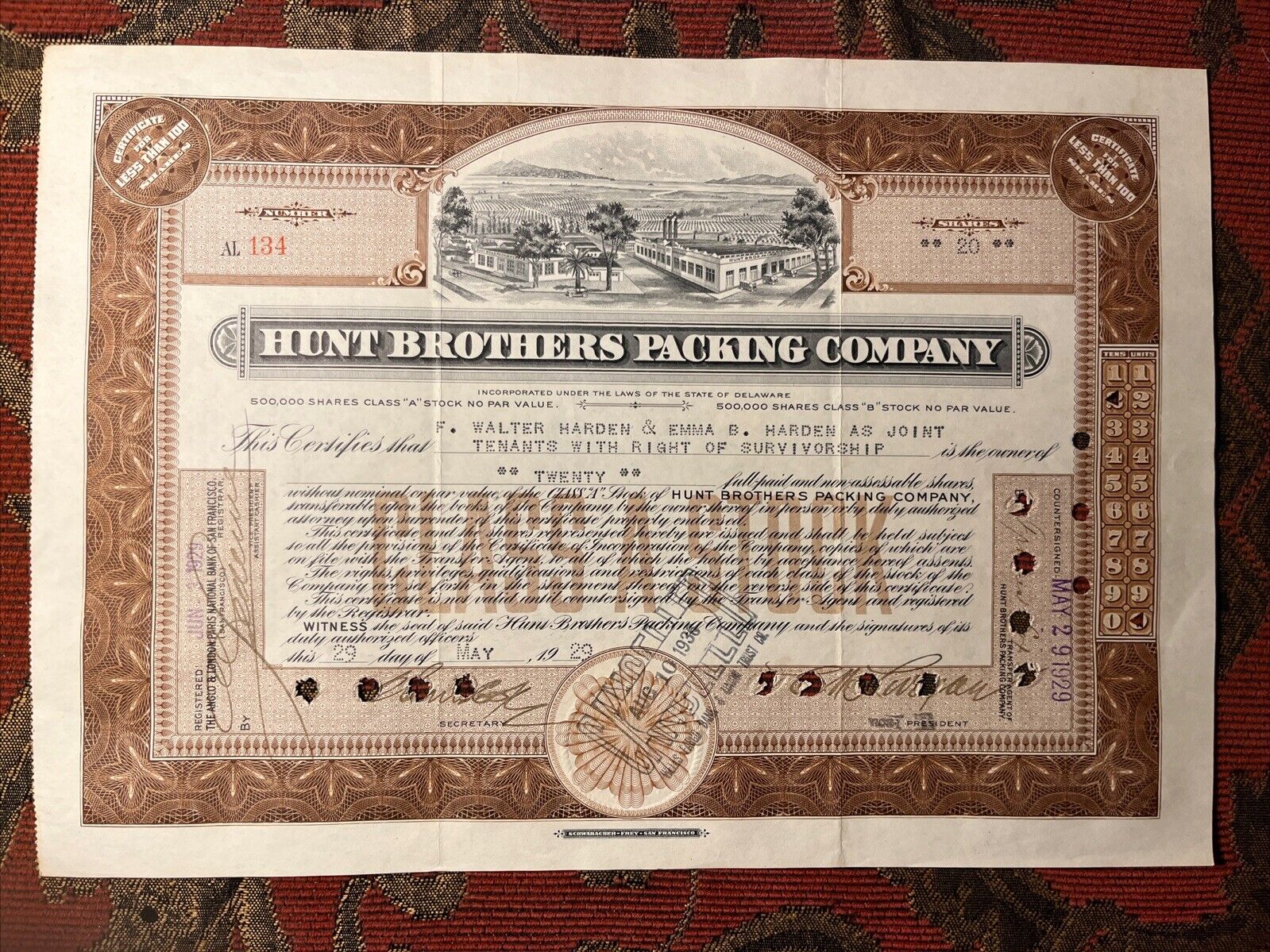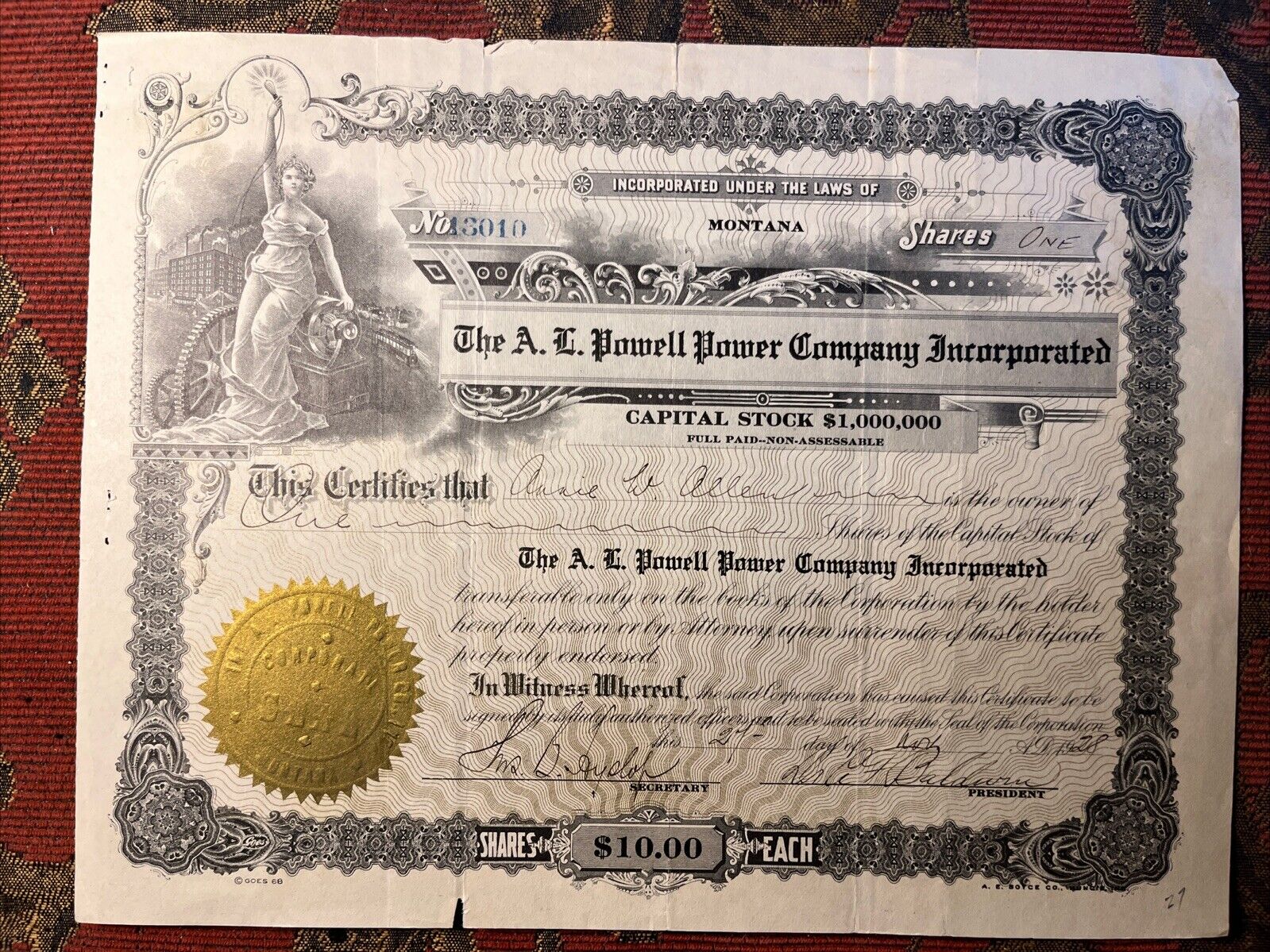-40%
B&O Railroad President Samuel Spencer & Baronet Signed 1887 Stock Certificate
$ 3.95
- Description
- Size Guide
Description
BALTIMORE AND OHIO RAILROAD PRESIDENT SAMUEL SPENCER SIGNED 1887 STOCK CERTIFICATE. CERTIFICATE IS ALSO SIGNED ON VERSO BY SIR CHRISTOPHER ROBERT LIGHTON, 7TH BARONET OF MERVILLE.**CERTIFICATE IS PUNCH-HOLE CANCELLED, AFFECTING SIGNATURE**
**CERTIFICATE WILL SHIP FOLDED ALONG EXISTING FOLD LINES**
Samuel Spencer
(March 2, 1847 – November 29, 1906) was an American
civil engineer
, businessman, and
railroad executive
. With an education interrupted by service in the
Confederate
cavalry late in the
American Civil War
, he completed his education at the
University of Georgia
and the
University of Virginia
.
Spencer spent his career with railroads, rising through the ranks during the busy growth years of American railroading in the late 19
th
Century. He eventually became president of six railroads, and was a director of at least ten railroads and several banks and other companies.
Although his career was cut short when he was killed in a fiery
train wreck
in Virginia in 1906, Samuel Spencer is best remembered as the
Father of the Southern Railway System
.
Spencer, North Carolina
, site of the
North Carolina Transportation Museum
, was named in his honor.
Samuel Spencer was born on March 2, 1847, in Columbus, Georgia, to Lambert Spencer and Vernona Mitchell. While still a teenager, Spencer left the Georgia Military Institute in Marietta to join the Confederate battle to secede from the Union in the American
Civil War
. He served in Captain Thomas Nelson's Rangers, an independent cavalry unit, and then with General
Nathan Bedford Forrest
's cavalry, which had some success in disrupting the communications lines of the
Union Army
.
When the war ended in 1865, Spencer left military service and enrolled in the
University of Georgia
at Athens. He earned his first degree in 1867, and went on to the engineering program at the
University of Virginia
, where he graduated at the top of his class in 1869.
In 1869, Spencer began working with railroads as a
surveyor
, and rose through the ranks, learning many aspects of railroad management. He became superintendent of the
Long Island Rail Road
in 1878 and was president of the
Baltimore and Ohio Railroad
(B&O) from December 10, 1887 to December 19, 1888.
In 1889, Spencer left the presidency of the B&O to become a railroad expert working for financier
J.P. Morgan
of
Drexel, Morgan and Company
. When the bankrupt
Richmond and Danville Railroad
(R&D) was acquired by Drexel, Morgan and Company in 1894, the new
Southern Railway
was formed by the financiers from a consolidation of the R&D and the
East Tennessee, Virginia and Georgia Railroad
.
Tapped to lead the new railroad for Morgan, Spencer became its first president. Under his leadership, the mileage of the Southern Railway doubled, greatly increased the number of passengers served annually, and annual earnings increased more than threefold. After his death, the Southern became one of the most profitable railroads in the
United States
, merging with the
Norfolk and Western Railway
in the 1980s to form
Norfolk Southern
.
Samuel Spencer's career was cut short when he was killed at the age of 59 in a train collision in
Virginia
before dawn on Thanksgiving morning, November 29, 1906. The Spencer party were in his private car, at the rear of the train, en route to his hunting lodge near Friendship, North Carolina. When the coupling failed on the lead car, the train was left stalled on the track. A following train ran into the stranded cars in the pre-dawn darkness, crushing the Spencer car, killing Spencer and all but one of its occupants. Spencer was buried at
Oak Hill Cemetery
.
Spencer is credited with leading the Southern Railway and the South during a period of unprecedented growth. After his untimely death, 30,000 Southern Railway employees contributed to pay for a
statue of him
by sculptor
Daniel Chester French
, who later sculpted the seated Abraham Lincoln statue in the Lincoln Memorial. The statue of Spencer was dedicated in 1910 and stood for many years at
Atlanta
's
Terminal Station
.
Sir Christopher Robert Lighton, 7th Baronet of Merville
(July 4, 1848 – August 15, 1929) was the
son of Sir Christopher Robert Lighton, 6th Baronet.
The Lighton Baronetcy, of Merville in Dublin, is a title in the
Baronetage of Ireland
. It was created on March 1, 1791 for Dublin-based banker and politician
Thomas Lighton
, the great-grandfather of
Sir Christopher Robert Lighton, 7th Baronet
.
After working as a trader in Strabane, Thomas Lighton travelled to India and became a soldier in the
East India Company
. He was rewarded with a gift of £20,000 by the wife of
General Richard Matthews
after successfully transporting the General's fortune from India to London. He returned to Ireland and used his money to establish the Lighton, Needham & Shaw Bank in
Dublin
alongside
Robert Shaw
. He held the office of
High Sheriff of County Dublin
in 1790. Between 1790 and 1797 Lighton sat in the
Irish House of Commons
as the
Member of Parliament
for
Tuam
. He also represented
Carlingford
in the Irish Commons from 1798 to 1800.
Sir Christopher Robert Lighton, 7th Baronet
,
was born at Epsom, Surrey, England. He was educated at Repton School and Trinity College, Cambridge, where he graduated with a B.A. in 1870. He became a member of the bar at Lincoln’s Inn in 1874, and practiced as a conveyancer. Lighton succeeded his father to the baronetcy in 1875. He served as Deputy Lieutenant and a Justice of the Peace for Herefordshire, and was High Sheriff in 1885. Lighton died in 1929, and was interred
at
North Berwick
Cemetery in
East Lothian
, Scotland.
Lighton married Helen Frances Houldsworth in 1880. She was the daughter of James Houldsworth of Coltness, Lanarkshire.













